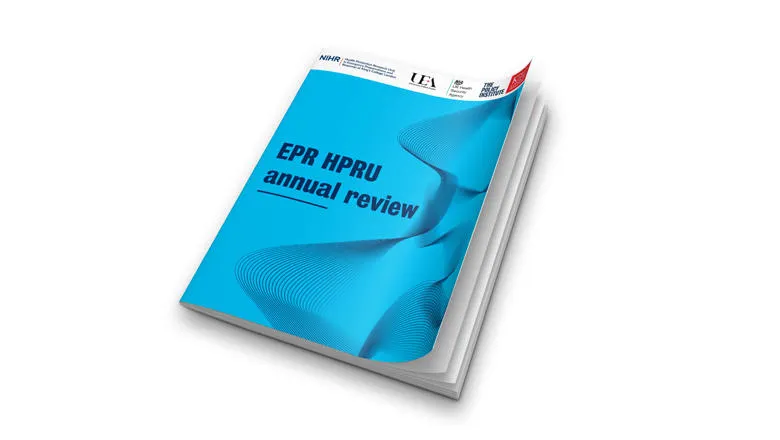20 July 2022
The vital role of the EPR HPRU in the UK's pandemic response
Baroness Manningham-Buller
The researchers were on the frontline of efforts to tackle Covid

The National Institute for Health and Care's Emergency, Preparedness and Response Health Protection Research Unit (EPR HPRU) is a partnership between King’s College London, Public Health England and the University of East Anglia.
In this foreword to our new essay collection, Baroness Manningham-Buller highlights the critical role of the unit in the UK's pandemic response.
I am delighted to introduce this fascinating report on the work of the Emergency, Preparedness and Response Health Protection Research Unit (EPR HPRU) at King’s College London, in partnership with UK Health Security Agency, during the Covid-19 pandemic.
The remit of the EPR HPRU covers many aspects of emergency preparedness and response, but the team has focussed on behavioural science in this report. And if anyone had any doubt about the critical importance of behavioural science, those doubts should have been roundly dispelled by the urgent and compelling need for it during the pandemic.
When asked to chair the Advisory Board of the unit, I accepted at once, partly because of my own background in MI5 – where our in-house behavioural science unit had proved invaluable over many decades – and partly because of what I saw of the discipline during my dozen years at the Wellcome Trust.
As the threat from Covid-19 emerged early in 2020, governments around the world soon faced hard decisions. Research teams rapidly switched their focus to support policymakers, with work on vaccines, therapeutics and diagnostics, and, of course, with advice from behavioural scientists.
In the UK we already had a group of government funded HPRUs, and the help of the Emergency Preparedness and Response Unit was soon sought by the government. The unit already had a high reputation from its experience studying crises including flooding, nuclear accidents, terrorism, cholera, ebola and swine flu, even botched assassination attempts.
Extensive demands were made on the unit as Covid-19 gathered pace. The team’s first paper was on the psychological impact of quarantine and this rapidly became one of the most cited papers in the two hundred year history of King’s.
The team has since then studied, for example, the spread of Covid-19 in care homes, the use of personal protection equipment by NHS staff, the effect on parents of home-schooling, the challenges of working from home, how to improve uptake of testing and self-isolation and much more. That work provided critical advice to those seeking at a national level, and not just in the UK, to manage the response to the crisis.
Based on the team’s high-quality research and reputation, six of its members were also invited to serve on SAGE and its subgroups. And the unit responded positively to the many requests which it received for media interviews. The chair of the unit, Sir Simon Wessely, interviewed many key people in a series for the Royal Society of Medicine, of which he was President at the start of the pandemic.
As the Covid-19 threat appears to be diminishing, the team in the unit has been reflecting on some of the lessons learned throughout the pandemic, and has generated other studies. These include explorations of adherence to self-isolation, the damaging effect of leaks from within government, how social divisions were exacerbated by Covid-19, the mental health of NHS staff, the barriers to seeking a test and the social psychology of emergency responders working as a team.
In its work on Covid-19 the unit has demonstrated how important and necessary it is. It responded brilliantly to the worst health crisis for many years. As the crisis stage of Covid-19 wains, let us hope that it will now be easier for the unit to focus on the “preparing” rather than “responding” part of its brief.
Baroness Manningham-Buller is Chair of the NIHR Health Protection Unit in Emergency Preparedness and Response Advisory Board and a former Director General of MI5.
